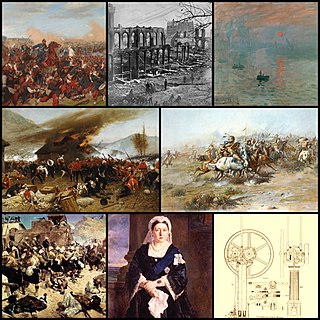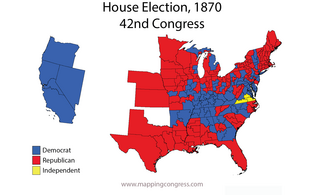Related Research Articles

The 1870s was a decade of the Gregorian calendar that began on January 1, 1870, and ended on December 31, 1879.

James Colledge Pope, was a land proprietor and politician on Prince Edward Island (PEI), Canada. He served as premier of the colony from 1865 to 1867, and from 1870 to 1873. He was premier of PEI in 1873 when the island joined Canadian confederation.

Benjamin Gratz Brown was an American politician. He was a U.S. Senator, the 20th Governor of Missouri, and the Liberal Republican and Democratic Party vice presidential candidate in the presidential election of 1872.
Members of the New South Wales Legislative Assembly who served in the sixth parliament of New South Wales held their seats from 1869 to 1872.</ref> The 1869–70 election was held between 3 December 1869 and 10 January 1870 with parliament first meeting on 27 January 1870. There were 72 members elected for 52 single member electorates, 6 two member electorates and 2 four member electorates. Due to a change in the Constitution of New South Wales the maximum term of this parliament was reduced from 5 years to 3. However the assembly was dissolved after only 25 months after the third government of Sir James Martin lost a vote of supply. The Speaker was William Arnold.
In the 1870 and 1871 United States Senate elections, the Republican Party lost five seats in the United States Senate, though it still retained an overwhelming majority. In advance of these elections, the last four seceded states were readmitted to the Senate.
The first Cowper ministry was the second ministry of the Colony of New South Wales, and was led by Charles Cowper. It was the first of five occasions that Cowper was Leader of the Government. Cowper was elected in the first free elections for the New South Wales Legislative Assembly held in March 1856, and fought unsuccessfully with Stuart Donaldson to form Government. When Donaldson's Government faltered a little over two months after it was formed, Cowper formed Government.
The fifth Cowper ministry was the twelfth ministry of the Colony of New South Wales, and the fifth and final occasion of being led by Sir Charles Cowper.
The 1870 Shrewsbury by-election was fought on 21 September 1870. The by-election was fought due to the Death of the incumbent MP of the Liberal Party, William James Clement. It was won by the Conservative candidate Douglas Straight.
The 1870 West Surrey by-election was fought on 8 September 1870. The by-election was fought due to the death of the incumbent Liberal MP John Ivatt Briscoe. It was won by the unopposed Conservative candidate Lee Steere. It was retained by the Conservatives in the 1874 general election.
The 1870 Dublin City by-election was fought on 18 August 1870. The by-election was fought due to the void election of the incumbent MP of the Conservative Party, Sir Arthur Edward Guinness. The election was voided because of his election agent's unlawful efforts, which the court found were unknown to the candidate.
The 1870 Brecon by-election was fought on 13 June 1870. The by-election was fought due to the Succession to a peerage of the incumbent MP of the Liberal Party, Lord Hyde. It was won by the Conservative candidate James Gwynne-Holford.
The 1870 Norwich by-election was fought on 13 July 1870. The by-election was fought due to the Void election of the incumbent MP of the Conservative Party, Sir Henry Stracey. It was won by the Liberal candidate Jacob Henry Tillett.
The 1870 Mayo by-election was fought on 12 May 1870. The by-election was fought due to the death of the incumbent Liberal MP George Henry Moore. It was won by the unopposed Liberal candidate George Ekins Browne.
The 1870 East Devon by-election was fought on 9 April 1870. The by-election was fought due to the resignation of the incumbent Conservative MP Lord Courtenay. It was won unopposed by the Conservative candidate John Henry Kennaway.
The 1870 Roxburghshire by-election was fought on 2 March 1870. The by-election was fought due to the resignation of the incumbent Liberal MP, Sir William Scott. It was won by the unopposed Liberal candidate Marquess of Bowmont.
The 1870 Nottingham by-election was fought on 24 February 1870. The by-election was fought due to the resignation of the incumbent MP of the Conservative Party, Charles Ichabod Wright. It was won by the Liberal candidate Auberon Herbert.
The 1870 Bridgnorth by-election was fought on 16 February 1870. The by-election was fought due to the resignation of the incumbent Conservative MP Henry Whitmore. It was won by the unopposed Liberal candidate William Henry Foster. The Liberals would hold their gain at the 1874 general election.
The Queen's County by-election of 1870 was fought on 4 January 1870. The by-election was fought due to the elevation to the peerage of the incumbent Liberal MP John Wilson FitzPatrick. It was won by the unopposed Liberal candidate Edmund Dease.

The 1870 United States elections occurred in the middle of Republican President Ulysses S. Grant's first term, during the Third Party System. Members of the 42nd United States Congress were chosen in this election. The election took place during the Reconstruction Era, and many Southerners were barred from voting. It was also the first election after the passage of the 15th Amendment, which prohibits state and federal governments from denying the right to vote on the basis of race, color, or previous condition of servitude, although disenfranchisement would persist. The Republican Party maintained a majority in both houses of Congress, although Democrats picked up several seats in both chambers.

The 1870 and 1871 United States House of Representatives elections were held in the middle of President Ulysses S. Grant's first term.
References
- ↑ "House of Commons". Archived from the original on 18 January 2014. Retrieved 25 November 2013.
{{cite web}}: CS1 maint: unfit URL (link) - ↑ Thomas Otte et al, By-Elections in British Politics, 1832-1914, p.120